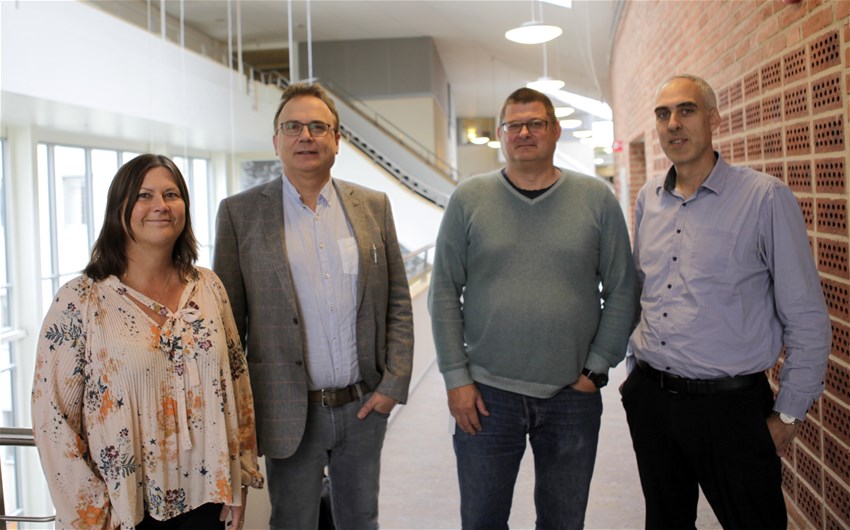University West creates AI influencer
23 Oct 2019
University West is in the early stages of developing a virtual influencer with the mission of getting young people to take an interest in technology. "We are using technology to inspire about technology," says Vice-Chancellor Martin Hellström.

Maria Derner (Head of Communication), Martin Hellström (Vice-Chancellor) togeher with the researchers Tobias Arvemo and Andreas de Blanche.
Within 15 years, Sweden will have a shortage of 35,000 engineers. To attract the Swedish youth to a future in technology, University West is launching the project The Life of A.R.T (Artificial Research Technology). The project aims to develop a virtual influencer whom will inspire young people to seek a career within the technology field.
– We see a need to communicate to a younger audience in order to maintain their interest in technology throughout their teens. We hope that this investment will create an interest in the education we offer at University West, but also that other universities, companies and organizations can benefit from the project, says Martin Hellström, Vice-Chancellor at University West
The influencer will be design entirely on the basis of its mission. The first step will be to create an AI tool that scans data on social media and identifies the interests and behaviors of the target audience. Andreas de Blanche and Tobias Arvemo are responsible for the development of the AI software at University West.
- I’m excited to be part of a project that are equal parts research and communication, or in other words, communication that is entirely based on data, says Andreas de Blanche, researcher in computer and information science.
- Because everything is measurable when it comes to digital media, we have a fantastic opportunity to adjust and optimize as the project progresses, continues Tobias Arvemo, researcher in science and mathematics.
The AI software will be designed to optimize the influencer when it comes to personality, forum, and content in regard to the target audience.
– The virtual influencer will give us unlimited possibilities. We can be anywhere on earth and in any context. At the same time, it is important to be transparent and show the challenges that a contemporary phenomenon like an AI influencer brings. Therefore, communication about and around the project will be as important as the influencer itself, says Maria Derner, Head of Communication at University West.
The project will put high demands on University West in both a technical and an ethical perspective. Because of this, the university hopes to attract partners who see the potential of reaching young people in a new and exciting way.
- To our knowledge, a virtual influencer has not been used in this way before. This technology is still in its infancy and we cannot be sure what the future will bring, but here at University West we go by the saying crazy enough – the only way to get ahead is by daring to try new ways, says Martin Hellström.
About virtual influencers
The concept of virtual influencers is relatively new but has quickly grown in popularity over the past years. The first virtual influencer, Lil Miquela (@lilmiquela), was created in 2016. With her 1.6 million followers on Instagram, she is also one of the biggest in her genre. The phenomenon has spread to Sweden as well. Earlier this fall, ICA (one of Sweden’s largest supermarket chain) launched a virtual baby on Instagram named Elis (@bebiselis).
Contact: Maria Derner, maria.derner@hv.se, +46 739 01 33 06


